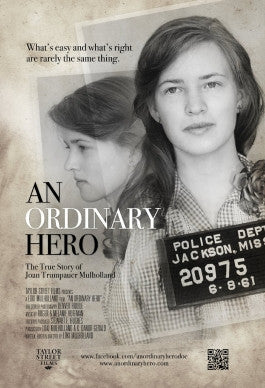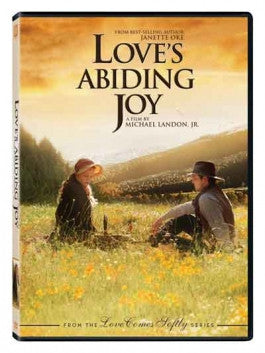
An Ordinary Hero DVD
Watch TrailerAdditional Information
- Cast: Joan Trumpauer Mulholland, Michael O'Brien, Joyce Ladner, Hank Thomas, John R. Salter
- Director: Loki Mulholland
- Producer: Loki Mulholland & K. Danor Gerald
- Languages: English
- Dove Approved: Dove Approved Ages 12+
- Run Time: 82 mins.
- Screen Format: WS
- Subtitles: English
- Closed Captioning: Yes
- Region Code: A See More
Sale price
$5.00
Regular price
$19.99
You save 75%
Estimated arrival between and for USA.

You might also like
An Ordinary Hero DVD
An Ordinary Hero is the true story of Joan Trumpauer Mulholland and the struggles she was forced to endure. By the time she was just nineteen years old, Joan had been shot at, attacked, and even put on death row. This was just the beginning of her extraordinary journey to changing the world. She was rejected by her family and is known as an unsung hero of the civil rights movement. An Ordinary Hero details the remarkable journey of Joan's life in the Civil Rights Movement. Her amazing spirit is resilient and allowed her to fight back against the world. Filmed over the course of a year in six different states, this film is the only complete story of Joan Trumpauer and the events she set into action. This movie also includes interviews with scholars, authors, journalists, and the people who fought battles side-by-side with Joan. An Ordinary Hero is the amazing true story of one white Southern woman's desire to join the Civil Rights Movement and her immense bravery.
The Life and Legacy of a Hero
Joan Trumpauer Mulholland, the woman who An Ordinary Hero describes, was a huge force in the Civil Rights Movement. She is known for being a part of numerous sit-ins and protests against racial segregation. She was willing to risk everything, including her education and her relationship with her family, in order to aid the Civil Rights movement.
Joan was born in Washington, D.C. and was raised in Arlington, Virginia. After she was born, her mother became very ill and she was raised by a black woman for the first three months of her life. Her great-grandparents had been slave owners in Georgia, and her family had black servants around the house. Joan's mother was very vocal about racism and strongly supported segregation. She recalls her mother saying to her once, "No matter how bad things are, at least you aren't black". These kinds of comments made Joan start thinking very deeply about the whole idea of racial segregation.
She was raised in a Christian home and attended church regularly with her family. She recalls learning verses of treating everyone with kindness and humanity, and singing songs about how we are all precious in the sight of God, regardless of our color. The values she was being taught in church were in direct conflict with what the people in the congregation were practicing. The wheels started turning in Joan's head as she realized that what they were living out was not what God would want them to do.
Joan later recalled an occasion when she and her friend dared each other to walk into the "negro town," which was located on the opposite side of the train tracks. Her eyes were opened as she saw the way they shrank back. She very clearly saw the pain in their eyes and the belief that they weren't as good as she was. This greatly bothered her and there and then she vowed to herself that she would be a part of the civil rights movement and help in any way that she could.
Her desire to be a part of the civil rights movement caused great strain in her relationship with her mother. Joan expressed a desire to go to a small, church university in Ohio or Kentucky, but her mother refused, saying that she didn't want her in the same classes as colored people. She demanded that Joan attend Duke University, and she was accepted.
In her first weeks at Duke, there was a rush among the boys and girls to enter into sororities and fraternities. Joan was not interested in this and attended meetings of the international clubs instead. The school recognized this as highly unusual behavior and sent a counselor to make sure that she was not unhappy or feeling ill.
In the spring of 1960, Joan participated in her very first sit-in, one of many to come. Since she was a typical white, Southern woman, her desire to aid the civil rights movement was marked as strange and unusual. After being arrested for the first time, she was taken in for mental testing.
There, in prison, Joan figured out a way to hide pieces of paper in her skirt so that she might be able to keep a diary of all that happened. In this diary she talks about ordinary life, such as what they ate and how they sang all night long. Segregation in jail cells bothered her, and she stated that she would rather have been locked up in the Negro cells, as she felt a kinship with them.
Because of her activism, she was disowned by her family and the civil rights movement became her life. Her father was not nearly as racist as her mother, but he was greatly concerned that Joan would be killed. She became part of the Freedom Riders, a group that challenged segregated buses. They refused to ride unless they rode together, forever changing the way transportation took place in that day.
Once again, Joan was arrested and spent time in prison for her activism. She served her time there and was released. Shortly after her release, the University of Georgia accepted its first black students ever, which was a huge milestone. She became the first white student to ever enroll at Tougaloo College, also a huge deal. Various attempts were made by the police to shut down Tougaloo because they were afraid of things that might happen between her and a black man, but they were unsuccessful and Joan stood firm.
Her parents later tried to reconcile their relationship and invited her to go to Europe with them, as a sort of bribe. She accepted, but as soon as the trip was over, she returned to Tougaloo College. After this, she participated in many more sit-ins and actively served in abolishing segregation.
Because of her great work in the civil rights movement, her story was documented in the film An Ordinary Hero. Joan left a great legacy of perseverance and faith for all the following generations to learn from. She believed firmly in justice and stood by her beliefs, making her a hero.
An Ordinary Hero is not rated by the Motion Picture Association of America, but is considered suitable for all audiences. It is always recommended that parents preview all content to determine what is suitable for their family.
Winner, Oxford Film Festival, Audience Choice Award Winner, Oxford Film Festival, Best Documentary Feature Winner, Crossroads Film Festival, Audience Choice Award











